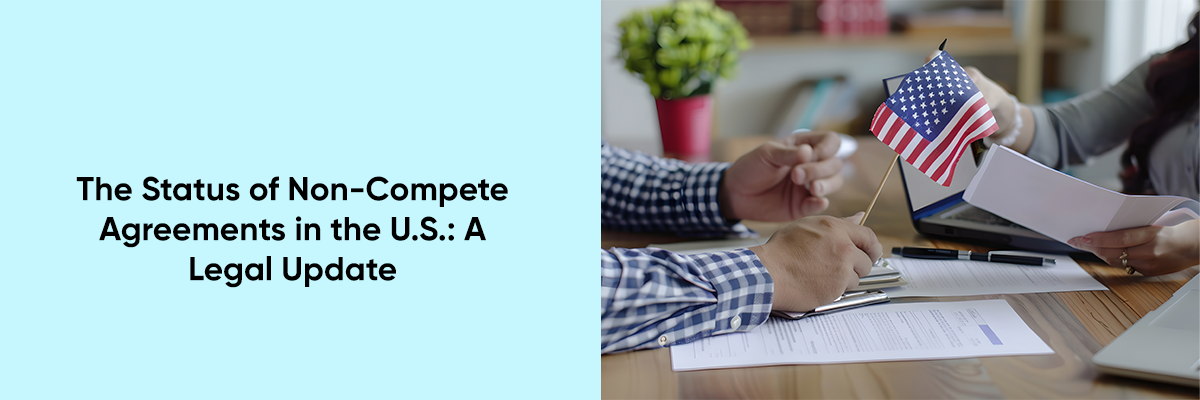Does your company calculate overtime for the extra work you do, and do you receive overtime pay? Have you signed a non-compete agreement with your company? If so, there’s good news for you!
Non-compete agreements can feel like a serious roadblock to career advancement, often leaving us wondering if we’ll ever work in the same industry again. These clauses, buried deep in employment contracts, have significant implications.
We decided to take a deep dive to see what’s happening with non-compete agreements in the U.S. Buckle up, because there are some updates regarding non-compete agreements that you need to know.



A Storm Brewing: The FTC Steps In
Here’s the big news: In April 2024, the Federal Trade Commission (FTC) threw a major wrench into the world of non-compete agreements. They announced a new rule that significantly limits how these agreements can be enforced. The FTC’s main concern? Noncompetes stifle competition in the job market. They worry these clauses make it harder for employees to find new opportunities and negotiate better salaries. It sounds like they’re on the side of employee mobility!
So, Does This Mean Non-Compete Agreements Are Toast?
Not quite! The FTC’s rule bans most non-compete agreements between employers and employees. However, there are some key exceptions. For example, the rule doesn’t apply to non-compete agreements with high-earning executives or exempt employees. There’s a specific salary threshold that determines who falls under this exception, so the details might vary depending on your location.
Another wrinkle: existing non-compete agreements with regular employees might still be enforceable depending on when they were signed and specific state laws. This is where things get a little complicated.
Let’s Get Concrete: Examples of Non-Compete Agreements
Imagine you’re a software engineer who has recently left a company specializing in developing e-commerce platforms. During your tenure, you contributed significantly to creating innovative solutions that improved the company’s market position. Upon your departure, you discover that your employment contract included a non-compete clause. This clause explicitly states that you are prohibited from working for another company that develops similar e-commerce platforms for a specified period, often ranging from six months to two years.
This restriction can significantly impact your career trajectory. Given your expertise and experience, most of your job opportunities are likely within the same industry. However, the non-compete clause limits your ability to pursue these positions, forcing you to either shift to a different sector or accept a role that may not fully utilize your skills and experience. Such constraints can hinder your professional growth and reduce your earning potential during the restricted period.
Breaking Down the Details: A State-by-State Landscape
Prior to the FTC’s rule, there were no federal regulations specifically addressing non-compete agreements. This meant enforceability depended entirely on individual state laws, creating a patchwork system across the country.
The FTC’s rule steps in and establishes a baseline for non-compete agreements at the federal level. This baseline essentially bans most non-compete agreements between employers and regular employees. However, it’s important to remember that:
- Exceptions Exist: The rule doesn’t apply to certain groups, like high-earning executives who do not receive overtime pay and for whom no overtime calculation is required.
- State Laws Still Matter: State laws can be stricter or more lenient than the FTC rule. For example, a state law might completely ban non-competes, even for executives.
What You Need to Do (or Not Do) Right Now
The FTC’s ruling is still fresh, and legal experts predict there will be some court challenges in the coming months. So, what should you do as an employee caught in this legal tug-of-war?
- Don’t Panic (Probably): If you’re an employee with a non-compete agreement, especially one signed before April 2024, it’s best to hold off on quitting your job just yet. The legal landscape is still shaking out, and it’s unclear how existing agreements will be handled.
- Knowledge is Power: Familiarize yourself with the FTC’s new rule and any relevant laws in your state. This will give you a better understanding of your rights and options.
- Seek Professional Help: If you’re unsure about a specific non-compete agreement, especially if you’re considering leaving your job, consult with an employment lawyer. They can provide specific guidance based on your situation and the legalities in your area.
The Future of Non-Compete Agreements: Cloudy with a Chance of Change
The FTC’s move is a significant shift in the way non-compete agreements are treated. While the full impact is yet to be seen, it seems like a step towards protecting worker mobility and giving employees more freedom when it comes to career choices. This could potentially lead to a more competitive job market and better opportunities for workers across the board.
By staying informed and understanding the evolving landscape of non-compete agreements, employees can better navigate their career paths and make informed decisions about their professional futures.


